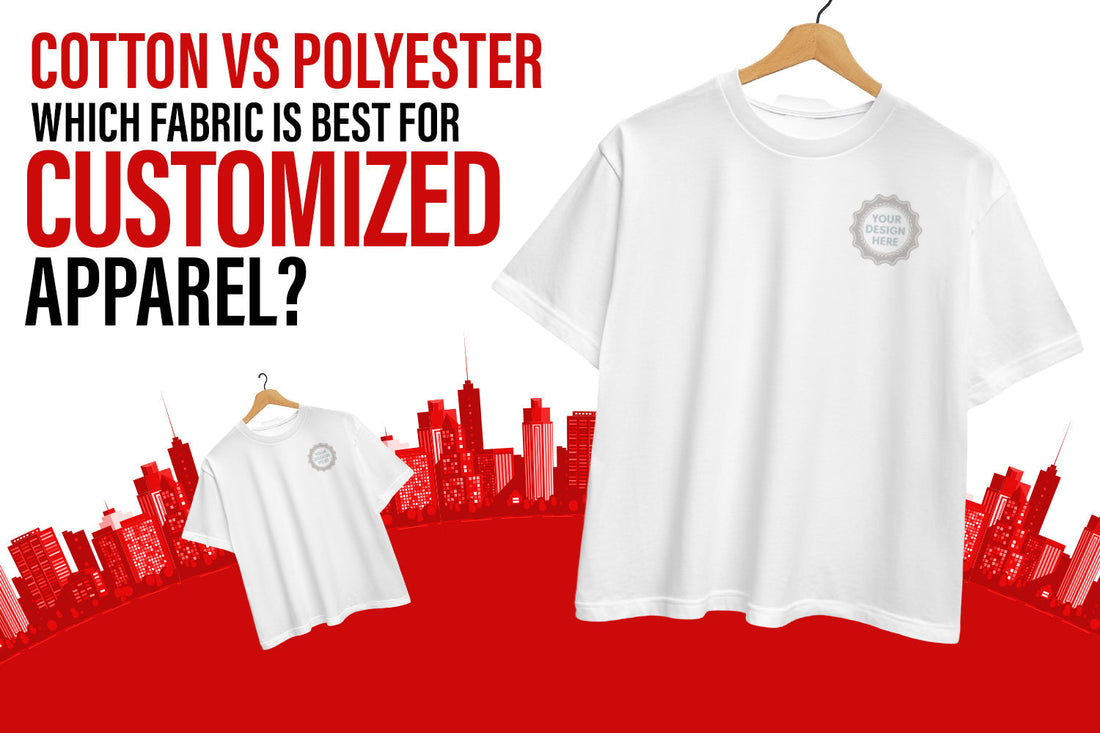
Cotton vs Polyester: Which Fabric Is Best for Customized Apparel?
Fabric selection is a big deciding factor for custom clothing when considering the comfort, longevity, and even the visual appearance of the product. Among the most common choices, Cotton vs. Polyester are the most significant ones. But it is really a question of which is more suitable for your needs. Here, we’re going to describe the properties, advantages, and disadvantages of each fabric, so you can easily decide to go with cotton or polyester for your custom t-shirts, hoodies, and other apparel.
What is cotton?
Cotton is a natural fiber obtained from the cotton plant. It is a fiber that has been used in clothing for ages due to its softness, breathability, and comfort. Besides, it makes cotton an excellent choice for people with allergies, and it performs excellently in absorbing moisture, thereby keeping the user cool in hot weather.
On the other hand, 100% cotton is not without its weaknesses. For example, it is prone to wrinkles, can be of a smaller size after washing, and gradually the color will lose its brightness with use and washing if it is exposed to mild detergents or the sun. Although it has these drawbacks, cotton is still the most popular choice for casual wear, daily t-shirts, and clothing intended for comfort.
What is polyester?
Polyester is a man-made fiber that is derived from products that come from petroleum. It is very flamboyant, and it does not lose its shape. When someone made a comparison of polyester vs cotton fabric, there were many instances where polyester led to the retention of its shape, resistance to getting wrinkles, and keeping bright colors even after washing.
The fact of the matter is that polyester is very comfortable for a customer. It is lightweight and takes the water off the fabric very quickly. This is why it is better used for sportswear, school uniforms, and the like. However, it is worth noting that polyester tends to trap heat and make the wearer uncomfortable during summer if the fabric in question stays dry. Therefore, we may see that designers love it because it is impossible to print facades that are so complicated on cotton as it is on polyester, and in addition, these prints do not fade with time.
Polyester vs. cotton: The main characteristics
It is not a tough thing to decide whether you should go for polyester or cotton. The answer to the problem is usually dependent on the needs of the user. See the comparison table below:
Comfort: Cotton is probably the best choice if you want a soft and breathable garment. As a matter of fact, polyester is manufactured in such a way that it is really smooth, but the fabric has a property of heat retention.
Durability: Polyester has 5 times more space research than cotton. It does not unravel and keeps the cotton cone with the strongest vigor; it binds together with time.
Printing: Polyester can be easily converted to sublimation printing, whereas fabric woven of cotton is compatible with screen print and direct-to-garment (DTG) methods.
Maintenance: Polyester has its silence just like a star does; it is low-maintenance, resistant to getting wrinkles, and dries very quickly after being washed. Cotton, by nature, needs to be maintained through washing, with the softener being carefully watched so as not to lose its softness.
The comparison between these two traditionally used fabrics can be handy while deciding what the best fabric for your custom t-shirts is. You may decide to wear these t-shirts for casual wear if comfort is important to you, or select the one that is durable, branded, and uniform if that is what you need.
Benefits of Cotton-Polyester Blends for Custom T-Shirts
A cotton-polyester blend keeps on being soft, breathable, and comfortable like cotton, yet durable and easy to take care of like polyester.
This kind of mixture is just right for custom t-shirts, logo wear (promotional garments), and corporate uniforms. They will notably reduce the shrinkage, keep raising the color vibrancy, and allow the print to be applied smoothly. Whatever the case—a custom polo t-shirt, hoodie, or activewear—it is going to be long-lasting and cozy due to a cotton-polyester blend, which is a win-win for designers as well as for users.
Printing Techniques and Fabric Compatibility
Different fabrics react in different ways depending on the printing method used. The combination you should opt for comes down to quality; high-end results are very crucial:
Screen Printing: It is a method that can be used with both pure cotton and cotton-polyester blends of fabrics. Cotton takes the ink better; thus, brighter prints can be produced.
Sublimation Printing: Is mainly used for polyester fabrics. The product gets deep down in the fabric; thus, there won't be any loss of color or cracking of the drawing.
Heat Transfer Vinyl (HTV): Works with the fabrics that are made of cotton, polyester, and blends; however, the temperature needs to be carefully controlled for the polyester so it won't melt.
Understanding polyester fabric vs. cotton in printing ensures your designs remain sharp, vibrant, and durable.
Final Thoughts: Choosing the Right Fabric for Your Needs
There is no 'one fabric fits all' scenario in custom clothing. Comfort, longevity, mode of printing, and clothing usage are what count when making your choice. Cotton doesn't hold any match when it comes to comfort and casual wear, polyester excels in durability and sportswear, and blends are the only transitional solution that fits the versatile nature of the users.
In case you are set to launch a custom apparel business, or if you just want to have personalized t-shirts and polos made, thinking of fabrics will save an extension of time, money, and the level of your customers' satisfaction. The thing that makes the difference is truly knowing your target group, the utility, and the printing way you take pleasure in.
Unitees by Style Union is the place where businesses or designers who need the best custom t-shirts for printing or branding can get the necessary premium fabrics and printing guidance, along with the assurance of professional-looking designs—minus the hassle of having to deal with inventory in bulk or go through trial-and-error processes. As a trusted company t shirt maker, Unitees ensures every design meets high-quality standards and reflects your brand identity perfectly.
FAQs
What is polyester?
Polyester is a fabric made from synthetic fibers of petroleum-based products, and its main features are that it is durable, resists wrinkles, and facilitates color retention.
Polyester fabric vs cotton—which is better for printing?
Cotton suits are best for screen printing, and polyester is ideal for sublimation printing. Nevertheless, blends can be engineered to get along with both printing types.
Can I blend cotton and polyester?
Yes, they offer a lovely mixture of the best characteristics of both fabrics—softness, comfort, durability, and printability—thus making them very versatile for custom apparel.
Which fabric is more breathable?
Cotton is a fabric with natural breathability; hence, it is the first choice for everyday wear or when the weather is hot.
Is polyester eco-friendly?
The production of polyester is not considered environmentally sustainable, as it is made from synthetic petrochemicals; however, recycled polyester products have come a long way and are now a common alternative for an eco-friendlier choice.
Also Read:
How to Style Polo T-Shirts: The Best 5 Ways to Wear Polo Outfits
10 Popular Types of Tank Tops for Women in 2025
Types of T-Shirt Necklines: A Complete Guide
